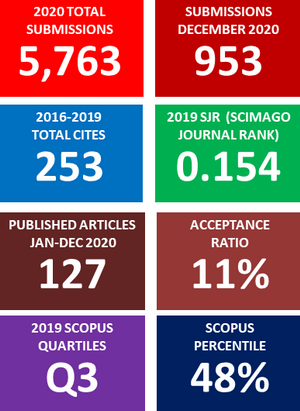At-Home Activities and Subjective Well-Being of Foreign College Students in Thailand during the COVID-19 Pandemic Outbreak
DOI:
https://doi.org/10.48048/wjst.2020.9931Keywords:
COVID-19, Well-being, Ordered probit model, At-home activities, ThailandAbstract
Sirindhorn International Institute of Technology (SIIT) is an international institute of Thammasat University (TU), located in Pathum Thani, Thailand. The courses are offered in English, and many foreign students are studying at SIIT-TU. The classes have been suspended since 16 March 2020 to slow down the COVID-19 disease spread, and the students are suggested to study online at home. The present study intends to understand the at-home activities and well-being of foreign students. A web-based survey was conducted from 22 through 23 March 2020 to record the activities and well-being of the students on 20 and 21 March 2020. Happiness and stress levels with the seven-points Likert scales were considered as the two output variables (1 = lowest and 7 = highest). The ordered probit model was applied to develop the subjective well-being models, taking into account at-home activities. The results highlighted that students who were happier were more likely to study for longer at home, but that studying for longer increases stress levels. Students who were less happy and more stressed were more likely to speak on the phone for longer, while doing exercise at home for longer increased the likelihood of happiness. This paper contributes to a better understanding of at-home activities associated with well-being of foreign students in Thailand during the COVID-19 outbreak.
Downloads
Metrics
References
World Health Organization. Mental Health and Psychosocial Considerations During COVID-19 Outbreak. World Health Organization. Available at: https://www.who.int/docs/default-source/coronaviruse/mental-health-considerations.pdf?sfvrsn=6d3578af_2, accessed March 2020.
World Health Organization. Coronavirus disease (COVID-19) Pandemic. Available at: https://www.who.int/emergencies/diseases/novel-coronavirus-2019, accessed April 2020.
CD Rio and PN Malani. COVID-19: New insights on a rapidly changing epidemic carlos. J. Am. Med. Assoc. 2020; 323, 1339-40.
J Liu, J Zhou, J Yao, X Zhang, L Li, X Xu, X He, B Wang, S Fu, T Niu, J Yan, Y Shi, X Ren, J Niu, W Zhu, S Li, B Luo and K Zhang. Impact of meteorological factors on the COVID-19 transmission: A multi-city study in China. Sci. Total Environ. 2020; 726, 138513.
J Hopman and B Allegranzi. Managing COVID-19 in Low- and Middle-Income Countries. J. Am. Med. Assoc. 2020; 323, 1549-550.
KH Kim. COVID-19. Int. Neurourol. J. 2020; 24, 1-1.
World Health Organization. Mental health and psychological resilience during the COVID-19 pandemic. Available at: http://www.euro.who.int/en/health-topics/health-emergencies/coronavirus-covid-19/news/news/2020/3/mental-health-and-psychological-resilience-during-the-covid-19-pandemic, accessed April 2020.
World Health Organization. Statement - Physical and mental health key to resilience during COVID-19 pandemic. Available at: http://www.euro.who.int/en/media-centre/sections/statements/ 2020/statement-physical-and-mental-health-key-to-resilience-during-covid-19-pandemic, accessed April 2020.
B Pfefferbaum and CS North. Mental health and the Covid-19 pandemic. N. Engl. J. Med. 2020; 383, 510-2.
T Shanafelt, J Ripp and M Trockel. Understanding and addressing sources of anxiety among health care professionals during the COVID-19 pandemic. J. Am. Med. Assoc. 2020; 323, 2133-4.
HJ McLaren, KR Wong, KN Nguyen and KND Mahamadachchi. Covid-19 and women’s triple burden: Vignettes from Sri Lanka, Malaysia, Vietnam and Australia. Soc. Sci. 2020; 9, 5.
J Corburn, D Vlahov, B Mberu, L Riley, WT Caiaffa, SF Rashid, A Ko, S Patel, S Jukur, E Martínez-Herrera, S Jayasinghe, S Agarwal, B Nguendo-Yongsi, J Weru, S Ouma, K Edmundo, T Oni and H Ayad. Slum health: Arresting COVID-19 and improving well-being in urban informal settlements. J. Urban Heal. 2020; 97, 348-57.
Prachatai. Thailand declares a State of Emergency, closes borders, tells senior citizens to stay home. Available at: https://prachatai.com/english/node/8429, accessed April 2020.
H Dong, J Zhang and C Cirillo. Exploring, understanding, and modeling the reciprocal relation between leisure and subjective well-being. Transp. Res. Part A Policy Pract. 2019; 130, 813-24.
RP Rajkumar. COVID-19 and mental health: A review of the existing literature. Asian J. Psychiatr. 2020; 52, 102066.
KE Train. Discrete Choice Methods with Simulation. Cambridge University Press, Cambridge, UK, 2003.
DA Hensher, JM Rose and WH Greene. Applied Choice Analysis. Cambridge University Press, Cambridge, UK, 2005.
AS Fullerton and J Xu. Ordered Regression Models. Taylor & Francis Group, London, UK, 2016.
N Carroll. Oglmx: A Package for Estimation of Ordered Generalized Linear Models. Available at: https://cran.r-project.org/web/packages/oglmx/vignettes/oglmxVignette.pdf, accessed April 2020.
Downloads
Published
How to Cite
Issue
Section
License
Copyright (c) 2020 Walailak University

This work is licensed under a Creative Commons Attribution-NonCommercial-NoDerivatives 4.0 International License.













